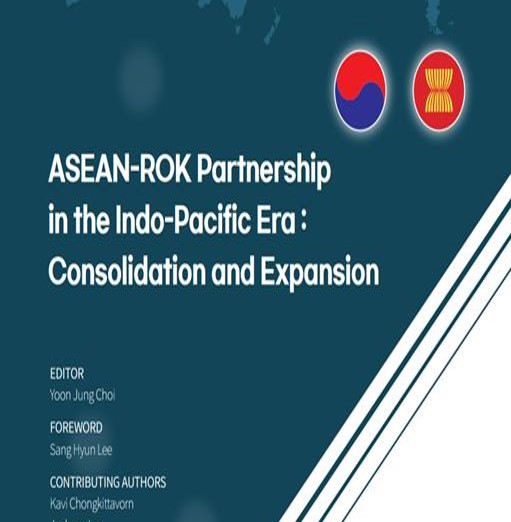ASEAN-ROK Partnership in the Indo-Pacific Era: Consolidation and Expansion
Editor: CHOI Yoon Jung
Contributing Authors:
Kavi Chongkittavorn
Jaehyon Lee
Geetha Govindasmy
Victor Andres “Dindo” C. Manhit
Satu Limaye
Ramon Pacheco Pardo
Sandip Kumar Mishra
Nguyen Bich Ngoc
Yoon Jung Choi
Publishing Date: January 2022
Volume: 116 pages
In 2021, actors in the Indo-Pacific including ASEAN member countries and the Republic of Korea (ROK, hereafter referred to as Korea) have experienced changes and continuities with the inauguration of the Biden administration. At the same time, continuing Sino-US rivalry and intensifying waves of COVID-19 infection globally presented new challenges to the region’s economy and threatened to erode multilateralism and rule-based order. In the long term, however, the region’s seeing disintegration may also provide novel opportunities to forge new and innovative forms of cooperation and partnership in the Indo-Pacific.
In view of these new developments and the evolving concept of Indo-Pacific, the Sejong Institute and the Korea Foundation co-organized a seminar on “ASEAN-ROK Partnership in the Indo-Pacific Era: Consolidation and Expansion” in November 2021 in order to understand how ASEAN, ROK and other regional partners approach the Indo-Pacific and suggest what options they can pursue together to realize peace and prosperity through cooperation and partnerships. After the announcement of AUKUS and other high-level meetings related to the Indo-Pacific, the seminar served as a much-needed platform to share and develop policy suggestions for navigating the complicated landscape of the region.
The book comprises contributions from nine distinguished experts who participated in the seminar, and H.E. Ambassador Ong Keng Yong and Ambassador Cho Byung- jae who have made great contributions to ASEAN and ROK’s progress honored this initiative by chairing Sessions 1 and 2. Chapter I of the book reviews the Indo-Pacific strategies of ASEAN and ROK and their current bilateral partnership in cultural, economic, and political domains. Suggestions to strengthen the ties between ASEAN member countries and ROK are made based on the convergences in their respective Indo-Pacific strategies. Chapter II then turns to the broader Indo-Pacific and focuses on ways to develop partnerships with other key stakeholders in the region such as the US, EU, and India. In this regards, Chapter III emphasizes the ASEAN-ROK partnership central in these multilateral approaches to fostering cooperation and ensuring peace and prosperity in the Indo-Pacific.
As multilateralism and rule-based order faced new challenges in 2021, new opportunities for innovative cooperation also emerged for ASEAN, ROK and their partners in the Indo-Pacific region. From this year’s seminar on ASEAN-ROK partnership, we learned how ROK and ASEAN have increasingly strengthened their ties with an emphasis on cultural exchange and what more we can do to build robust multilateralism led by cooperation between middle powers in the region. Not losing sight of ASEAN centrality, we envision a future in which Korea, ASEAN, and our partners can work together to ensure peace and prosperity for all in the Indo-Pacific region.

 파일명
파일명